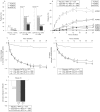Efficacy and safety of certolizumab pegol plus methotrexate in active rheumatoid arthritis: the RAPID 2 study. A randomised controlled trial
- PMID: 19015207
- PMCID: PMC2674556
- DOI: 10.1136/ard.2008.101659
Efficacy and safety of certolizumab pegol plus methotrexate in active rheumatoid arthritis: the RAPID 2 study. A randomised controlled trial
Abstract
Background: Certolizumab pegol is a PEGylated tumour necrosis factor inhibitor.
Objective: To evaluate the efficacy and safety of certolizumab pegol versus placebo, plus methotrexate (MTX), in patients with active rheumatoid arthritis (RA).
Methods: An international, multicentre, phase 3, randomised, double-blind, placebo-controlled study in active adult-onset RA. Patients (n = 619) were randomised 2:2:1 to subcutaneous certolizumab pegol (liquid formulation) 400 mg at weeks 0, 2 and 4 followed by 200 mg or 400 mg plus MTX, or placebo plus MTX, every 2 weeks for 24 weeks. The primary end point was ACR20 response at week 24. Secondary end points included ACR50 and ACR70 responses, change from baseline in modified Total Sharp Score, ACR core set variables and physical function.
Results: Significantly more patients in the certolizumab pegol 200 mg and 400 mg groups achieved an ACR20 response versus placebo (p< or =0.001); rates were 57.3%, 57.6% and 8.7%, respectively. Certolizumab pegol 200 and 400 mg also significantly inhibited radiographic progression; mean changes from baseline in mTSS at week 24 were 0.2 and -0.4, respectively, versus 1.2 for placebo (rank analysis p< or =0.01). Certolizumab pegol-treated patients reported rapid and significant improvements in physical function versus placebo; mean changes from baseline in HAQ-DI at week 24 were -0.50 and -0.50, respectively, versus -0.14 for placebo (p< or =0.001). Most adverse events were mild or moderate, with low incidence of withdrawals due to adverse events. Five patients developed tuberculosis.
Conclusion: Certolizumab pegol plus MTX was more efficacious than placebo plus MTX, rapidly and significantly improving signs and symptoms of RA and physical function and inhibiting radiographic progression.
Trial registration number: NCT00175877.
Conflict of interest statement
Figures



Comment in
-
New tumour necrosis factor inhibitors for rheumatoid arthritis: are there benefits from extending choice?Ann Rheum Dis. 2009 Jun;68(6):767-9. doi: 10.1136/ard.2008.105940. Ann Rheum Dis. 2009. PMID: 19435722 No abstract available.
References
-
- Feldmann M, Brennan FM, Maini RN. Role of cytokines in rheumatoid arthritis. Ann Rev Immunol 1996;14:397–440 - PubMed
-
- Maini RN, Elliott MJ, Brennan FM, Williams RO, Chu CO, Paleolog E, et al. Monoclonal anti-TNF alpha antibody as a probe of pathogenesis and therapy of rheumatoid disease. Immunol Rev 1995;144:195–223 - PubMed
-
- Redlich K, Schett G, Steiner G, Hayer S, Wagner EF, Smolen JS. Rheumatoid arthritis therapy after tumor necrosis factor and interleukin-1 blockade. Arthritis Rheum 2003;48:3308–19 - PubMed
-
- Furst DE, Breedveld FC, Kalden JR, Smolen JS, Burmester GR, Bijlsma JW, et al. Updated consensus statement on biological agents, specifically tumour necrosis factor α (TNFα) blocking agents and interleukin-1 receptor antagonist (IL-1RA), for the treatment of rheumatic diseases, 2005. Ann Rheum Dis 2005;64(suppl 4):iv2–14 - PMC - PubMed
-
- Maini R, St Clair EW, Breedveld F, Furst DE, Kalden J, Weisman MH, et al. Infliximab (chimeric anti-tumour necrosis factor alpha monoclonal antibody) versus placebo in rheumatoid arthritis patients receiving concomitant methotrexate: a randomised phase III trial. ATTRACT Study Group. Lancet 1999;354:1932–9 - PubMed
Publication types
MeSH terms
Substances
Associated data
LinkOut - more resources
Full Text Sources
Other Literature Sources
Medical

